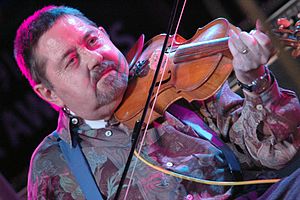Dave Swarbrick
| Dave Swarbrick | ||
|---|---|---|

Swarbrick performing in London, 2006
|
||
| Background information | ||
| Birth name | David Cyril Eric Swarbrick | |
| Also known as | 'Swarb' | |
| Born |
5 April 1941 New Malden, Surrey, England |
|
| Died | 3 June 2016 (aged 75) | |
| Genres | Folk music, folk rock, electric folk | |
| Occupation(s) | Musician, songwriter, arranger | |
| Instruments | Violin, mandolin, guitar, viola, mandolin, guitar, Twelve-string guitar | |
| Years active | 1960s – 2016 | |
| Labels | Transatlantic, Sonet, Logo | |
| Associated acts | Ian Campbell Folk Group, Martin Carthy, Fairport Convention, Whippersnapper, Swarb's Lazarus | |
| Notable instruments | ||
| Music sample | ||
|
|
||
David Cyril Eric Swarbrick (5 April 1941 – 3 June 2016) was an English folk musician and singer-songwriter. He has been described by Ashley Hutchings as 'the most influential [British] fiddle player bar none' and his style has been copied or developed by almost every British and many world folk violin players who have followed him. He was one of the most highly regarded musicians produced by the second British folk revival, contributing to some of the most important groups and projects of the 1960s, and he became a much sought-after session musician, which led him throughout his career to work with many of the major figures in folk and folk rock music.
His work for the group Fairport Convention from 1969 has been credited with leading them to produce their seminal album Liege & Lief (1969) which initiated the electric folk movement. This, and his subsequent career, helped create greater interest in British traditional music and was highly influential within mainstream rock. After 1970 he emerged as Fairport Convention's leading figure and guided the band through a series of important albums until its disbandment in 1979.
He also played in a series of smaller, acoustic units and engaged in solo projects. He maintained a massive output of recordings and a significant profile and made a major contribution to the interpretation of traditional British music.
Born in 1941 in New Malden, now in Greater London, his family moved to Linton, near Grassington, North Yorkshire, where he learned to play the violin. In the late 1940s the family moved to Birmingham, where he attended Birmingham College of Art (now absorbed into the Birmingham Institute of Art and Design) in the late 1950s, with the intention of becoming a printer. After winning a talent contest with his skiffle band, he was introduced to Beryl and Roger Marriott. The Marriotts took him under their wing and Beryl discovered that he had played the violin up until the skiffle craze; she actively encouraged him to switch back to the fiddle, and he joined the Beryl Marriott Ceilidh Band.
...
Wikipedia
